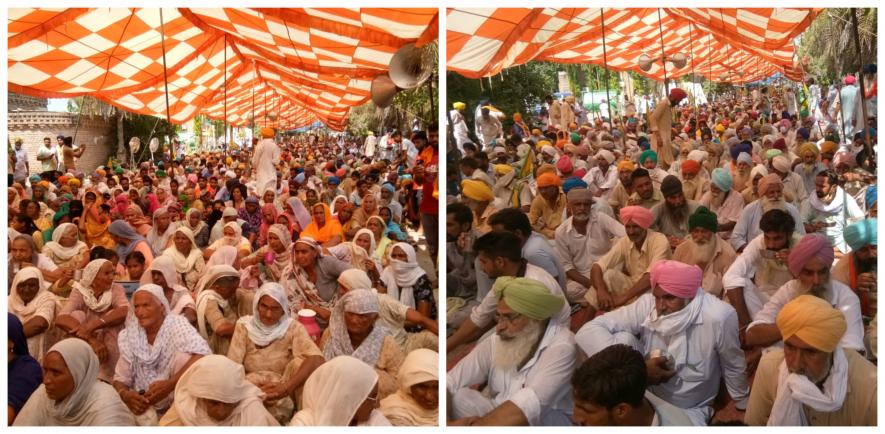Farmers Plan Strikes, Road Blockades, ‘Rail Roko’ Protests Against 3 Agri Bills

Farmers, led by Bharatiya Kisan Union - Ekta Ugrahan, laid siege to mansions of SAD president Sukhbir Badal and his wife and Union Cabinet Minister Harsimrat Kaur Badal at Badal village in Punjab. Courtesy - Special Arrangement.
New Delhi: The outcry by farmers is getting louder in several parts of India against three agriculture-related Bills tabled by the Narendra Modi government during the ongoing Monsoon session of Parliament. Farmers, who have been on the streets since the past few days, have decided to intensify their protest with strikes, road blockades, and ‘rail roko’ across the country.
In Haryana, 19 farmers’ organisations have threatened to block national highways in each district in the state for three hours – from 12 noon to 3 p.m – on September 20, if their demand for scrapping the so-called agri ‘reform’ Bills is not considered. The farmers are set to be joined by 30,000 arhtiyas (commission agents), who have vowed to strike work across all Agricultural Produce Market Committee (APMC) mandis in the state for an indefinite period, starting September 18.
In Punjab, at least 10 farmer organisations, raising similar demands, have given a state-wide bandh call on September 25. The decision was taken on Wednesday, a day after one of the three farm sector Bills secured the Lok Sabha’s approval. All businesses, road and rail traffic will be shut during the bandh, the organisations have had decided.
On the same date (Septmeber 25), a country-wide ‘resistance’ call has been given by the All India Kisan Sangharsh Coordination Committee (AIKSCC) – an umbrella of 250 farmers’ organisations. The call for rallies is likely to stall local economic activities in parts of Delhi, Western Uttar Pradesh, Telangana, Odisha among others.
In Rajasthan, the 247 APMC mandis across the state will observe a one-day strike on September 21.
Given the rising spate of protests being envisaged –which have been going on across the country ever since the Modi government brought into force in June three agri-trade ordinances -- the Centre’s response seems to be ‘business as usual’, which has angered the farming community even more, as they see the Bills as serving corporate interests and doing away with minimum support prices (MSP) for crops.
Replacing the ordinances, the three Bills – The Farmers (Empowerment and Protection) Agreement of Price Assurance and Farm Services Bill, 2020; The Farmers’ Produce Trade and Commerce (Promotion and Facilitation) Bill, 2020; and the Essential Commodities (Amendment) Bill, 2020 – were tabled in Parliament on Monday, despite the reservations recorded by Opposition-ruled state governments and Shiromani Akali Dal (SAD), a constituent of the Bharatiya Janata Party-led National Democratic Alliance government at the Centre.
An ordinance, promulgated by the President, must be approved by Parliament within six weeks of reassembling or they cease to operate.
Satnam Singh Pannu, president, Kisan Sangharsh Committee, Punjab told Newsclick that the proposed reforms would be completely rejected by the people of Punjab. “The Bills are not in the interest of the farmers and hence, we are protesting. The Centre should have first consulted with the farmers’ organisation before bringing any changes to the laws – however, it didn’t deem it necessary,” he said.
Punjab Chief Minister Amarinder Singh has also submitted a memorandum to the Governor, seeking his intervention to stop the law.
On Tuesday, the amendment to the 1955 Essential Commodities Act that sought deregulation of foodgrain stocks and the prices that could be asked for them was also passed after a tumultuous Lok Sabha debate.
Leaders of Congress, Trinamool Congress, Nationalist Congress Party among others reportedly accused the ruling government for legalising hoarding. Other Opposition members also demanded that it be referred to parliamentary standing committee.
The rest of the legislations – one of which allows the trading of farmers’ produce outside the mandi system; while, the other introduces framework for contract farming – were scheduled for consideration and passing on Thursday.
Gardev Singh of Bharatiya Kisan Union (BKU) – Ekta Ugrahan charged the Central government of “centralising” the issues and decision-making process that come under state subject list. He spoke to Newsclick from Badal village in Punjab, where hundreds of farmers led by his outfit have laid siege to kothi (mansion) of SAD president Sukhbir Badal and his wife and Union Cabinet Minister Harsimrat Kaur Badal – from September 15 to 20.
“The SAD has fooled the farmers and is now taking U-turns after farmers’ protest. The party must break away its alliance with BJP, if it is serious about protecting our interests,” Singh said.
Harpal Singh, state secretary, BKU – Haryana, said: “The ordinances are aimed at turning farmers into labourers – who will then be required to produce according to the requirements of the agriculture companies in the coming years.”
“Think about a small farmer – with no bargaining power – entering into a contract with a private company. His/her interests are bound to get compromised for the benefit for the company. What protection the government will then offer to that small farmer?” he added.
Haryana.
Besides this, the government is also bringing inviting private participation in the distribution of electricity, which he feared would take away subsidies currently enjoyed by farmers across the country.
Harsh Girdhar, vice president, Haryana State Anaj Mandi Arhtiyas Association, told Newsclick that agriculture reforms would collapse the anaj mandis – especially when no taxes are levied on trade of farm produce outside the mandi system.
His concerns were echoed by Ratan Lal of Rajasthan Khadya Padarth Vyapaar Sangh, an umbrella body of functionaries in APMCs, who said that currently the state government also enjoys revenue in the form of mandi fee and rural development cess.
With business taken away from the mandis, commission agents and with them lakhs of labourers will recede to penury, Girdhar said, claiming that this “will lead to resentment and unrest in the rural areas.”
Hannan Mollah, general secretary, All India Kisan Sabha (AIKS) expressed anguish over the “apathetic” attitude of the Central government and called for “no more protests but resistance.”
“One protests to voice concerns in a democratic set-up of governance, however , when the nature of rule takes a fascistic turn with the government no longer representing the interests of the people, what is required is to resist such rules,” said Mollah, who is also a working group member of AIKSCC.
In the days to come, Mollah said, farmers’ protests will only get intensified. “These are attacks on the livelihoods of farmers, how can they not protest?”
Get the latest reports & analysis with people's perspective on Protests, movements & deep analytical videos, discussions of the current affairs in your Telegram app. Subscribe to NewsClick's Telegram channel & get Real-Time updates on stories, as they get published on our website.
























